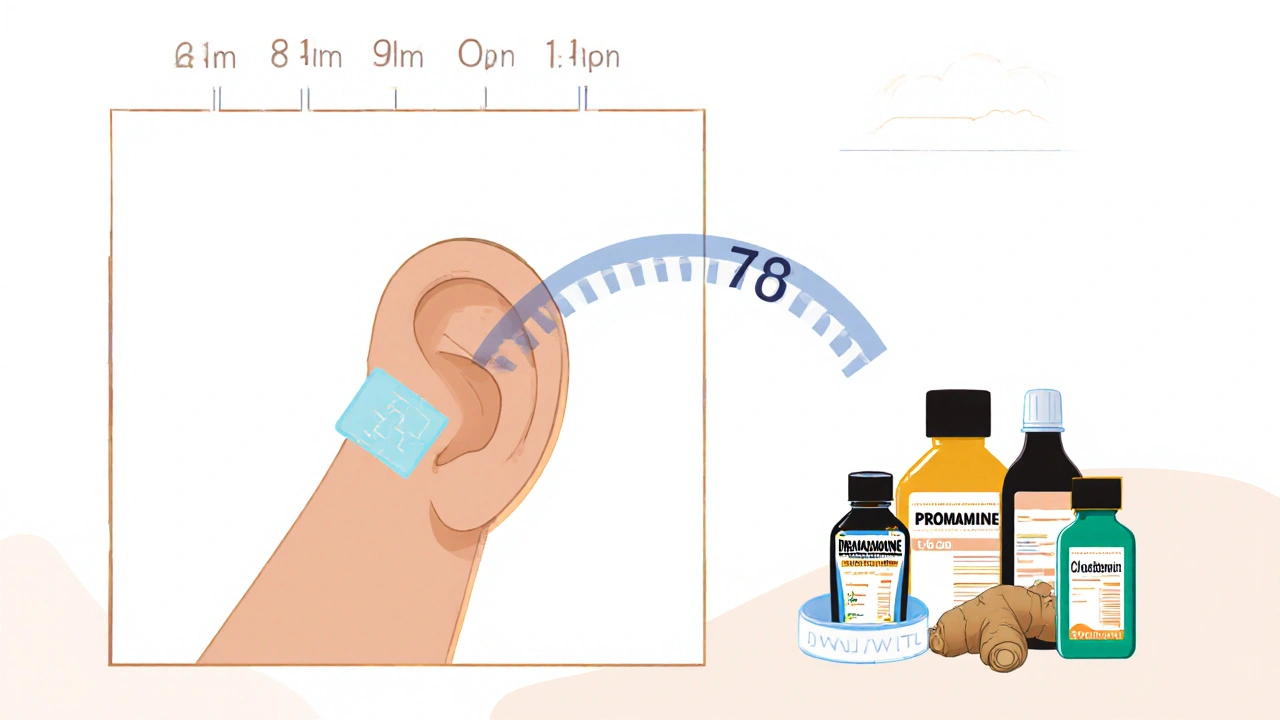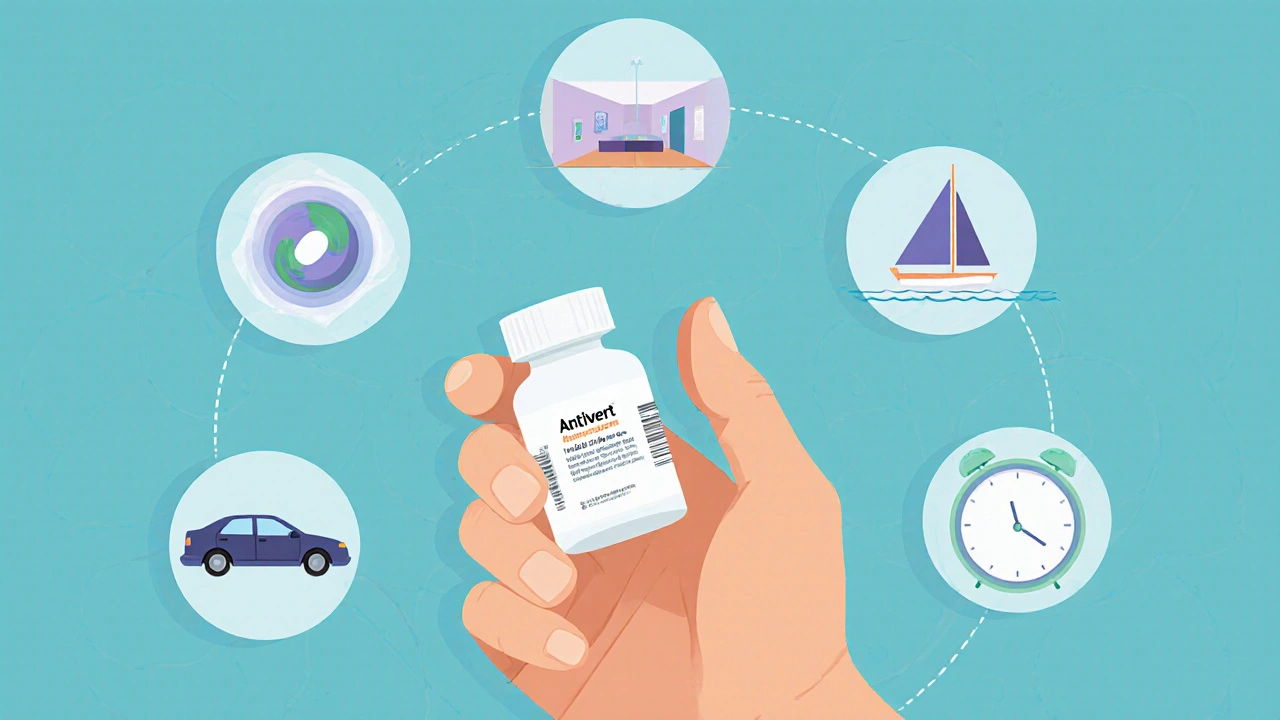If you’ve been hit with sudden dizziness, spinning rooms, or nausea on a boat or in a car, you’ve probably heard of Antivert - the brand name for meclizine. It’s one of the most common over-the-counter and prescription meds used for vertigo and motion sickness. But is it the best option? Are there other pills, patches, or natural fixes that work just as well - or better? Let’s cut through the noise and compare meclizine with real alternatives, based on how they actually work, how fast they kick in, and what side effects you’re likely to deal with.
What Meclizine (Antivert) Actually Does
Meclizine is an antihistamine, but not the kind that makes you sneeze. It works by blocking signals from your inner ear to your brain that tell you you’re spinning or moving when you’re not. That’s why it’s so effective for vertigo caused by inner ear problems like benign paroxysmal positional vertigo (BPPV) or Meniere’s disease. It also helps with motion sickness by calming the part of your brain that controls nausea.
Most people take one 25 mg tablet about an hour before travel or when symptoms start. It kicks in within 30 to 60 minutes and lasts 8 to 24 hours. But here’s the catch: it doesn’t fix the root cause. It just silences the symptoms. And that’s fine for short-term relief - but if you’re taking it daily for weeks, you might be masking something bigger.
Dimenhydrinate (Dramamine): The Stronger Sibling
If you’ve ever been seasick on a fishing trip, you’ve probably reached for Dramamine. Its active ingredient is dimenhydrinate - a close cousin to meclizine, but stronger. Dimenhydrinate is a mix of diphenhydramine (the same stuff in Benadryl) and 8-chlorotheophylline. That combo hits harder and faster.
For motion sickness, dimenhydrinate often wins in speed. People report feeling better in under 20 minutes. But the trade-off? Drowsiness. A lot of it. In fact, studies show up to 70% of users feel sleepy, compared to 30-40% with meclizine. If you’re driving, working, or need to stay alert, dimenhydrinate might leave you useless.
Also, it doesn’t last as long. You might need to re-dose every 4 to 6 hours. That’s inconvenient. And if you’re prone to dry mouth or blurred vision, you’ll notice it more with dimenhydrinate than with meclizine.
Scopolamine Patch: The Long-Lasting Option
If you’re planning a week-long cruise or have chronic vertigo that won’t quit, the scopolamine patch (Transderm Scop) is worth considering. It’s a prescription patch you stick behind your ear. It releases a steady dose of scopolamine over 72 hours. No pills. No refills. Just one patch.
It’s more effective than meclizine for severe motion sickness. A 2023 review in the Journal of Travel Medicine found scopolamine reduced nausea by 68% compared to 45% with meclizine in long-duration travel scenarios. It’s also the go-to for post-op nausea.
But it’s not perfect. Side effects include dry mouth, blurred vision, and dizziness - yes, even more dizziness - in about 20% of users. Some people report feeling weirdly detached or confused. And if you’re over 65 or have glaucoma, it’s a no-go. The patch also needs to be applied 4 hours before symptoms start. That means planning ahead. No last-minute fixes.
Promethazine (Phenergan): The Heavy Hitter
Promethazine is a prescription antihistamine that’s used for severe nausea, vomiting, and motion sickness. It’s stronger than meclizine and works faster. In emergency rooms, it’s often the first line for violent vomiting.
It comes in pills, injections, and suppositories. For motion sickness, a 25 mg pill taken 30-60 minutes before travel works well. But the side effects? They’re serious. Extreme drowsiness, low blood pressure, and in rare cases, muscle stiffness or tremors. It’s also not recommended for kids under 2, and many doctors avoid it for older adults because of fall risks.
Compared to meclizine, promethazine is like using a sledgehammer to crack a nut. It works - but only if you really need the firepower. For most people with mild vertigo or occasional car sickness, it’s overkill.

Natural Alternatives: Ginger and Acupressure
Not everyone wants to take pills. And for some, even mild drowsiness from meclizine is a dealbreaker. That’s where natural options come in.
Ginger - in capsule, tea, or candy form - has been studied for motion sickness for decades. A 2022 meta-analysis in the Journal of Alternative and Complementary Medicine found ginger was as effective as dimenhydrinate in reducing nausea, with far fewer side effects. One study showed 1 gram of ginger powder taken before a boat ride cut vomiting by 60%. No drowsiness. No dry mouth. Just a spicy taste.
Acupressure wristbands (like Sea-Bands) press on the P6 point on your inner wrist. They’re cheap, reusable, and safe for kids and pregnant women. Studies show mixed results, but many users swear by them. They won’t stop the spinning, but they can reduce nausea enough to make you functional.
Neither ginger nor acupressure fixes vertigo caused by inner ear issues. But for motion sickness? They’re solid, low-risk options.
When to Stick With Meclizine - and When to Switch
Meclizine isn’t perfect, but it’s the sweet spot for most people. Here’s when it’s your best bet:
- You need mild, all-day relief without heavy drowsiness
- You’re using it occasionally for car rides, flights, or amusement parks
- You’re over 65 and can’t risk stronger meds
- You’re pregnant (meclizine is Category B - safer than most alternatives)
Switch if:
- You need faster relief - try dimenhydrinate (but accept the sleepiness)
- You’re on a long trip and want one-time protection - go for the scopolamine patch
- You’re allergic to antihistamines or get severe dry mouth - try ginger
- Your dizziness keeps coming back - see a doctor. It might be BPPV, which can be fixed with a simple head maneuver called the Epley maneuver.
What Doctors Don’t Tell You
Most people think vertigo is just ‘motion sickness’ - but it’s not always the same thing. If you’re dizzy without movement - like when you roll over in bed - you might have BPPV. That’s not caused by your brain getting confused. It’s caused by tiny crystals in your inner ear moving where they shouldn’t. Meclizine won’t fix that. But a 5-minute physical therapy move will.
And if you’re taking meclizine daily for weeks? You’re probably not treating the problem. You’re just hiding it. Chronic dizziness can be linked to migraines, low blood pressure, thyroid issues, or even anxiety. A simple blood test or balance assessment can uncover what’s really going on.
Also, don’t mix meclizine with alcohol, benzodiazepines, or sleep aids. That combo can slow your breathing. That’s not a risk you want to take.

Quick Comparison Table
| Treatment | Onset | Duration | Drowsiness Risk | Best For |
|---|---|---|---|---|
| Meclizine (Antivert) | 30-60 min | 8-24 hrs | Low to moderate | Occasional motion sickness, older adults, pregnancy |
| Dimenhydrinate (Dramamine) | 15-30 min | 4-6 hrs | High | Severe nausea, short trips |
| Scopolamine Patch | 4 hrs (before use) | 72 hrs | Moderate | Cruises, long travel, post-op |
| Promethazine (Phenergan) | 20-40 min | 6-12 hrs | Very high | Severe vomiting, medical settings |
| Ginger (capsules) | 30-60 min | 4-6 hrs | None | Prefer natural, pregnant, kids |
| Acupressure Bands | Immediate | As long as worn | None | Mild nausea, prevention, safety |
Frequently Asked Questions
Is meclizine safe to take every day?
Meclizine is approved for short-term use - usually a few days to a week. Taking it daily for weeks or months isn’t recommended unless your doctor is monitoring you. Long-term use can mask underlying issues like inner ear disorders, migraines, or even heart problems. If you’re dizzy every day, see a specialist. You might need balance testing or an MRI.
Can I take meclizine with other medications?
Avoid combining meclizine with alcohol, sedatives, opioids, or other antihistamines like Benadryl. It can cause dangerous drowsiness or breathing problems. Also, if you’re on blood pressure meds, meclizine might lower it further. Always check with a pharmacist before mixing.
Does meclizine help with anxiety-related dizziness?
Sometimes. If your dizziness is tied to panic attacks or stress, meclizine might calm the physical symptoms - but it won’t fix the anxiety. For long-term relief, therapy, breathing exercises, or SSRIs are more effective. Meclizine is a band-aid, not a cure.
Which is better for pregnancy: meclizine or ginger?
Both are considered safe in pregnancy. Meclizine is Category B, meaning no risk has been proven in studies. Ginger is natural and has no known risks. Many OB-GYNs recommend ginger first - capsules or tea - because it avoids drug exposure. If ginger doesn’t help, meclizine is the next step.
Can children take meclizine?
Meclizine is not recommended for kids under 12. For motion sickness in children, ginger capsules (age-appropriate doses) or acupressure bands are safer. If a doctor prescribes it for a child, it’s usually only for severe cases and under close supervision.
What to Do Next
If you’ve been relying on meclizine for months and still feel off, it’s time to dig deeper. Keep a symptom diary: when does the dizziness happen? After eating? When you turn your head? During stress? That info helps doctors spot patterns.
For vertigo that comes and goes - especially with ear fullness or ringing - ask about the Epley maneuver. It’s free, takes 5 minutes, and fixes BPPV in 80% of cases. For motion sickness, try ginger capsules before your next road trip. For long trips, ask your doctor about the scopolamine patch.
Don’t just keep reaching for the same pill. Your body is trying to tell you something. Listen to it - and treat the cause, not just the symptom.


Post A Comment